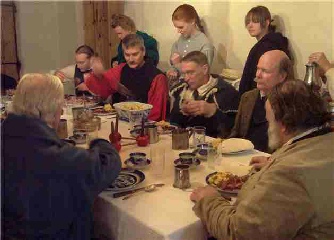Subject Guide

Mountain West
Malachite’s Big Hole
Dining Formalities at Forts and Posts:
Although the United States was not a class-conscious nation like England, dining at the larger forts and posts did take into account the status of the employee or guest.

Rudolph Kurz was employed as a clerk while at Fort Union in 1851 and made the following observations regarding first and second tables in his journal:
"All employees are furnished board and lodging free of charge; that means, engageés are provided with nothing but meat, a place to sleep, and one raw buffalo hide. Hunters and workmen eat at the second table, i.e. meat, biscuit, and black coffee with sugar. Clerks are served with the bourgeois at the first table, which is, on an average, a well furnished table for this part of the country. We have meat, well selected, bread, frequently soup and pie on Sundays."
and the following:
"A bell summoned me to the first table with Mr. Denig [factor at Fort Union] and the clerks. My eyes almost ran over with tears! There was chocolate, milk, butter, omelet, fresh meat, hot bread-what a magnificent spread!"
Not only was the fare at first table more sumptuous but the men sitting at first table were expected to present a more formal appearance. Charles Larpenteur, was engaged as a clerk at Fort Union, starting during the summer of 1834. Larpenteur provides the following description of the initial time that he sat at first table (Forty Years a Fur Trader):
"I happened to have a pair of gray cassinette pants which I had brought from the States, and had seldom worn; that and my clean blue check shirt and my old cap were the only dress I possessed on entering Fort Union. All the clerks were strangers to me, and when the bell rang for supper I saw them put on their coats, for, as I found out afterward, they were not allowed to go to table in shirtsleeves. One of them, perceiving that I was coatless, was so kind as to lend me a coat, and so we started for supper. On entering the eating hall, I found a splendidly set table with a very white tablecloth, and two waiters, one a negro. Mr. McKenzie [the fort factor] was sitting at the head of the table, extremely well dressed. The victuals consisted of fine fat buffalo meat, with plenty of good fresh butter, cream, and milk for those that chose; but I saw that only two biscuits were allowed to each one, as these were placed at each plate. I soon discovered, by the manner in which the clerks took their seats, that mine would come very near the end of the table, for it appeared to go by grade; but it was not many years until I reached next to head. I was hungry, and had such victuals been placed before me the day previous, while I was on horse guard, I should have played my part like a man. But among strangers I could not help being a little backward, and did not eat half to my satisfaction. As good luck would have it, some of the clerks used to take lunch before going to bed; so a large kettle of fat buffalo meat was put on to boil, and out of this I finished filling up...... I awoke early, perhaps thinking in my sleep that I had my horses to turn out; but no, there were no horses for me to turn out. Mr. McKenzie, who played the nabob, went to bed late, and rose later, and as nothing could be served till he was ready, it was nine o'clock before we got to breakfast. B ut it came at last, and this morning I filled up fuller, with more ease."
Prince Maximilian (reference) records the following while a guest of Kenneth McKenzie at Fort Union on June 25, 1833: "...we lived here very pleasantly, in a plain style, suitable to the resources of so remote a place; for we could not hope to meet with so good a table as we had had on board the steamer. We had, every day, fresh or dried buffalo flesh, bread made of flour, and also a good supply of coffee and wine.."
Back to the Top
Back to Everyday Life